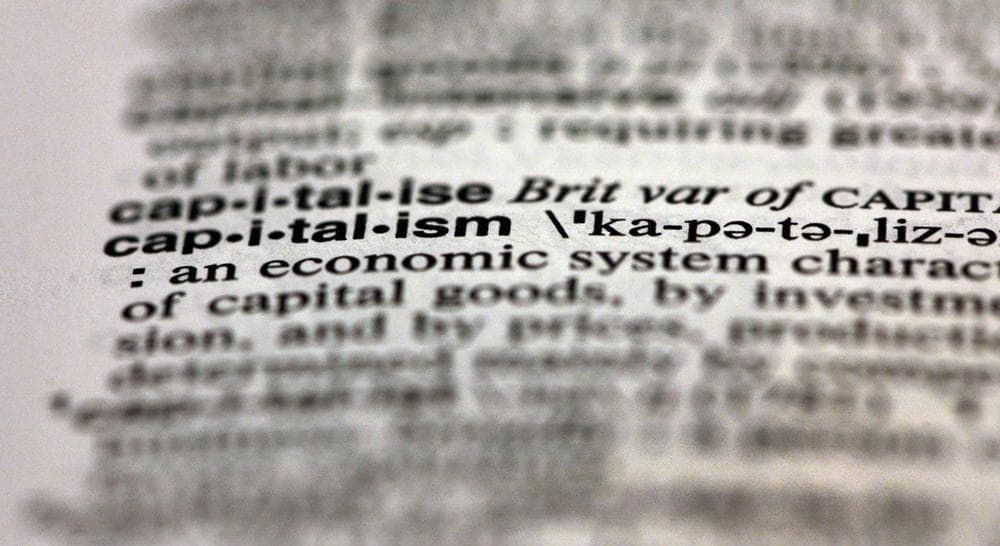Advertisement
How insecurity contributes to disenchantment with democracy

Sign up for the On Point newsletter here.
People all over the world feel economically and culturally insecure.
Indian economist Pranab Bardhan says liberal leaders aren’t paying enough attention to that, and that’s led to a growing disenchantment with democracy.
Today, On Point: How economic and cultural insecurity contributes to disenchantment with democracy.
Guest
Pranab Bardhan, distinguished professor emeritus of economics at the University of California, Berkeley. Author of 17 books, including A World of Insecurity: Democratic Disenchantment in Rich and Poor Countries and Charaiveti: An Academic's Global Journey.
Book Excerpt
Excerpt from A World of Insecurity by Pranab Bardhan. Not to be republished without permission. All rights reserved.
Interview Highlights
On economic and cultural insecurity around the world
"Economic insecurity, of course, is very important. I mean, obviously, if you lose your job, that's a big thing in your life and the culture can wait. But if economic insecurity was the main issue, then there are cases, I can give you examples. Let me give you the example of Sweden. In Sweden is somewhat an exception to most of the rich countries. The data show that if you take 25 of the richest countries, on an average, about 60% of their households, sometimes even more, 65% of the households had either stagnant income, an income didn't change or falling income.
"So that's obviously an indicator of economic insecurity. Sweden did not have that. In Sweden, that percentage was about 20%. Yet, As you know, very recently, in fact, after my book came out in late 2022, after that, Sweden had an election in which not merely the leading party is the right-wing party, but it's backed by an extreme right-wing party with neo-Nazi roots. So this is happening in Sweden, which [is a] relatively economically secure country. Country workers don't have falling or stagnant income as much like the other countries. And even so, it happened in Sweden. So that tells you that it's not just economic insecurity. And the main cultural insecurity issue, of course, by these extreme right-wing parties is about immigration."
Advertisement
On weakening democracies
"This populist demagogues are utilizing these anxieties, harvesting the result of these anxieties. And by the way, I gave immigration, as an example, in other countries, including in rich countries, but in developing countries, religious tensions is a very extremely important issue. Now, all of this, we are weaving into a sense of ethnic nationalism. And that's where religion plays an important role. So Christian nationalism, say in Poland. Catholic nationalism in Poland. In the United States, Brazil, it's more like Iran's Christian evangelical nationalism."
" ... Similarly in in Erdogan's Turkey, Islamic nationalism, in Indonesia and Islamic nationalism and in India, it's Hindu nationalism. And so it's this ethnic nationalism that is connected with the majority race, majority religion and majority native population, which then this the incitement is for xenophobia. Incitement is against minority. And the great replacement that I was talking about, this manufactured victimhood of the majority population, that very soon they're going to outnumber us.
"There's some minorities and immigrants are going to outnumber us. This great replacement theory. There are many rightwing intellectuals, though, in France, for example, in the United States, they are talking about some very soon that we are all going to be outnumbered. In India, the Hindu nationalists say we are going to be outnumbered by Muslims, even though Muslim is only about 14%, 15% of the population. So this exaggerated fear upgrade to placement is playing a very important role."
On an ideal diverse democracy
"I think it's more complicated than that. And that's why I want to say, I want to say it's only culture insecurity. Cultural insecurity is intertwined with economic insecurity. So when there's an impression that the jobs are going away and it's easier to blame, foreigners like Chinese are taking away our jobs, or it's easy to blame immigrants, they're taking our jobs, even though in reality immigrants are not taking the actual jobs that the rest of the population are doing.
"But it is easy to blame others for example, a large part of economists will tell you that a large part of the job losses in the United States and Europe are due to automation. But you will not hear about that as much because automation is a force which is a kind of inexorable technological force. It's much easier to blame others. Blame foreigners. Blame minorities. Blame immigrants. So that's when the whole discussion turns there.
"So it's a combination of economic insecurity and cultural insecurity. In my book, I talk about both and whenever there is anxiety. And by the way, this anxiety is not just about yourself, your jobs, anxiety about your children. I may have a secure job today, but I'm worried about when my children grow up, will they have a job?"
On engaging with cultural insecurity seriously
"Democrats now are gradually realizing that the cultural issues are important, but one cannot just. These are not at the individual level. That's why you need community organizations. And trade union to me is an is a civic organization, is a community organization.
"And it's not just trade union, trade union is a major one. But I think locally in terms of neighborhood associations ... I think what enriches democracy are these intermediate institutions, what I'm calling intermediate institutions, intermediate between the state and the citizen. In the intermediate level, you know, there's parent teachers' associations, neighborhood associations, trade unions. ... To me is a very important part of those intermediate institutions. And at these levels, Democrats, if they really take these issues seriously, have to energize these local community and civic organizations."
This program aired on April 24, 2023.

